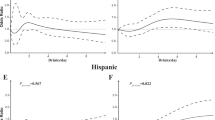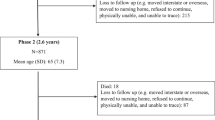Abstract
Background/Objectives:
The habitual consumption of a specific type of alcoholic beverage may be related to the overall dietary pattern. The objective of this cross-sectional study was to investigate associations between alcoholic beverage preference and dietary intake in The Netherlands.
Subjects/Methods:
A total of 2100 men and women from the Dutch National Food Consumption Survey 2007–2010 were studied. A general questionnaire assessed alcoholic beverage preference and two non-consecutive 24-h dietary recalls assessed overall diet. Mean nutrient and food group intakes, and adherence to the 2006 Dutch dietary guidelines across categories of alcoholic beverage preference were compared and adjusted for age, sex, body mass index (BMI), education, smoking, physical activity, energy intake and frequency and absolute alcohol consumption.
Results:
Largest differences in dietary habits were detected between persons who preferred wine and those who preferred beer. Persons with a beer preference had a higher absolute intake of meat, soft drinks, margarine and snacks. In contrast, persons with a wine preference had a higher absolute consumption of healthy foods. However, after multiple adjustments, wine consumers still consumed less energy and more vegetables and fruit juices compared with beer consumers. Adherence to the Dutch dietary guidelines did not differ between preference categories after multiple adjustments.
Conclusions:
In this cross-sectional analysis in a representative sample of the Dutch population, a beer preference was associated with less healthy dietary behaviour, especially compared with wine preference. However, these differences were largely explained by other socio-demographic and lifestyle factors. These results suggest that alcoholic beverage preference may not be independently related to diet.
This is a preview of subscription content, access via your institution
Access options
Subscribe to this journal
Receive 12 print issues and online access
$259.00 per year
only $21.58 per issue
Buy this article
- Purchase on Springer Link
- Instant access to full article PDF
Prices may be subject to local taxes which are calculated during checkout
Similar content being viewed by others

References
Costanzo S, Di Castelnuovo A, Donati MB, Iacoviello L, de Gaetano G . Wine, beer or spirit drinking in relation to fatal and non-fatal cardiovascular events: a meta-analysis. Eur J Epidemiol 2011; 26: 833–850.
Shaper AG, Wannamethee G, Walker M . Alcohol and mortality in British men: explaining the U-shaped curve. Lancet 1988; 2: 1267–1273.
Criqui MH, Ringel BL . Does diet or alcohol explain the French paradox? Lancet 1994; 344: 1719–1723.
Klatsky AL, Friedman GD, Armstrong MA, Kipp H . Wine, liquor, beer, and mortality. Am J Epidemiol 2003; 158: 585–595.
Barefoot JC, Gronbaek M, Feaganes JR, McPherson RS, Williams RB, Siegler IC . Alcoholic beverage preference, diet, and health habits in the UNC Alumni Heart Study. Am J Clin Nutr 2002; 76: 466–472.
McCann SE, Sempos C, Freudenheim JL, Muti P, Russell M, Nochajski TH et al. Alcoholic beverage preference and characteristics of drinkers and nondrinkers in western New York (United States). Nutr Metab Cardiovasc Dis 2003; 13: 2–11.
Ruidavets JB, Bataille V, Dallongeville J, Simon C, Bingham A, Amouyel P et al. Alcohol intake and diet in France, the prominent role of lifestyle. Eur Heart J 2004; 25: 1153–1162.
Tjonneland A, Gronbaek M, Stripp C, Overvad K . Wine intake and diet in a random sample of 48763 Danish men and women. Am J Clin Nutr 1999; 69: 49–54.
Johansen D, Friis K, Skovenborg E, Gronbaek M . Food buying habits of people who buy wine or beer: cross sectional study. BMJ 2006; 332: 519–522.
Alcacera MA, Marques-Lopes I, Fajo-Pascual M, Foncillas JP, Carmona-Torre F, Martinez-Gonzalez MA . Alcoholic beverage preference and dietary pattern in Spanish university graduates: the SUN cohort study. Eur J Clin Nutr 2008; 62: 1178–1186.
Chatenoud L, Negri E, La Vecchia C, Volpato O, Franceschi S . Wine drinking and diet in Italy. Eur J Clin Nutr 2000; 54: 177–179.
Bendsen NT, Christensen R, Bartels EM, Kok FJ, Sierksma A, Raben A et al. Is beer consumption related to measures of abdominal and general obesity? A systematic review and meta-analysis. Nutr Rev 2012; 71: 67–87.
Veenstra J, Schenkel JA, van Erp-Baart AM, Brants HA, Hulshof KF, Kistemaker C et al. Alcohol consumption in relation to food intake and smoking habits in the Dutch National Food Consumption Survey. Eur J Clin Nutr 1993; 47: 482–489.
Mannisto S, Uusitalo K, Roos E, Fogelholm M, Pietinen P . Alcohol beverage drinking, diet and body mass index in a cross-sectional survey. Eur J Clin Nutr 1997; 51: 326–332.
van Rossum CTM, Fransen HP, Verkaik-Kloosterman J, Buurma-Rethans EJM, Ocké MC . Dutch National Food Consumption Survey 2007-2010: Diet of Children and Adults 7 to 69 Years. National Institute for Public Health and the Environment (RIVM): Bilthoven, The Netherlands,, 2011.
Slimani N, Deharveng G, Charrondiere RU, van Kappel AL, Ocke MC, Welch A et al. Structure of the standardized computerized 24-h diet recall interview used as reference method in the 22 centers participating in the EPIC project. European Prospective Investigation into Cancer and Nutrition. Comput Methods Progr Biomed 1999; 58: 251–266.
Slimani N, Ferrari P, Ocke M, Welch A, Boeing H, Liere M et al. Standardization of the 24-hour diet recall calibration method used in the european prospective investigation into cancer and nutrition (EPIC): general concepts and preliminary results. Eur J Clin Nutr 2000; 54: 900–917.
RIVM. Nederlandse Voedingsstoffenbestand. Den Haag: Voedingscentrum, 2011.
van Lee L, Geelen A, van Huysduynen E, de Vries JH, Van't Veer P, Feskens EJ . The Dutch Healthy Diet index (DHD-index): an instrument to measure adherence to the Dutch Guidelines for a Healthy Diet. Nutr J 2012; 11: 49.
Health Council of The Netherlands. Guidelines for a healthy diet 2006. Health Council of The Netherlands: The Hague, 2006.
Statistics Netherlands. Available at http://statline.cbs.nl Accessed on 1 January 2008.
Carmona-Torre Fde A, Garcia-Arellano A, Marques-Lopes I, Basora J, Corella D, Gomez-Gracia E et al. Relationship of alcoholic beverage consumption to food habits in a Mediterranean population. Am J Health Promotion 2008; 23: 27–30.
Sanchez-Villegas A, Toledo E, Bes-Rastrollo M, Martin-Moreno JM, Tortosa A, Martinez-Gonzalez MA . Association between dietary and beverage consumption patterns in the SUN (Seguimiento Universidad de Navarra) cohort study. Publ Health Nutr 2009; 12: 351–358.
Valencia-Martin JL, Galan I, Rodriguez-Artalejo F . The association between alcohol consumption patterns and adherence to food consumption guidelines. Alcohol Clin Exp Res 2011; 35: 2075–2081.
Gronbaek M, Mortensen EL, Mygind K, Andersen AT, Becker U, Gluud C et al. Beer, wine, spirits and subjective health. J Epidemiol Commun Health 1999; 53: 721–724.
Nielsen NR, Schnohr P, Jensen G, Gronbaek M . Is the relationship between type of alcohol and mortality influenced by socio-economic status? J Intern Med 2004; 255: 280–288.
Mortensen EL, Jensen HH, Sanders SA, Reinisch JM . Better psychological functioning and higher social status may largely explain the apparent health benefits of wine: a study of wine and beer drinking in young Danish adults. Arch Intern Med 2001; 161: 1844–1848.
Breslow RA, Guenther PM, Smothers BA . Alcohol drinking patterns and diet quality: the 1999-2000 National Health and Nutrition Examination Survey. Am J Epidemiol 2006; 163: 359–366.
Klipstein-Grobusch K, Slimani N, Krogh V, Keil U, Boeing H, Overvad K et al. Trends in self-reported past alcoholic beverage consumption and ethanol intake from 1950 to 1995 observed in eight European countries participating in the European Investigation into Cancer and Nutrition (EPIC). Publ Health Nutr 2002; 5: 1297–1310.
Acknowledgements
This research was supported by The European Foundation for Alcohol Research (ERAB) and The Dutch Beer Institute.
Author information
Authors and Affiliations
Corresponding author
Ethics declarations
Competing interests
The authors declare no conflict of interest.
Additional information
Disclaimer
The sponsors did not have any role in the design and conduct of the study; collection, management, analysis and interpretation of the data; and preparation, review or approval of the manuscript.
Rights and permissions
About this article
Cite this article
Sluik, D., van Lee, L., Geelen, A. et al. Alcoholic beverage preference and diet in a representative Dutch population: the Dutch national food consumption survey 2007–2010. Eur J Clin Nutr 68, 287–294 (2014). https://doi.org/10.1038/ejcn.2013.279
Received:
Revised:
Accepted:
Published:
Issue Date:
DOI: https://doi.org/10.1038/ejcn.2013.279
Keywords
This article is cited by
-
Alcohol consumption patterns and adherence to the Mediterranean diet in the adult population of Spain
European Journal of Nutrition (2024)
-
Folgeerkrankungen bei Alkoholmissbrauch
CME (2018)
-
Alcoholic beverage preference and diabetes incidence across Europe: the Consortium on Health and Ageing Network of Cohorts in Europe and the United States (CHANCES) project
European Journal of Clinical Nutrition (2017)
-
Alkohol im Alter
Humanmedizin kompakt (2015)
-
Alkohol im Alter
Zeitschrift für Gerontologie und Geriatrie (2015)


